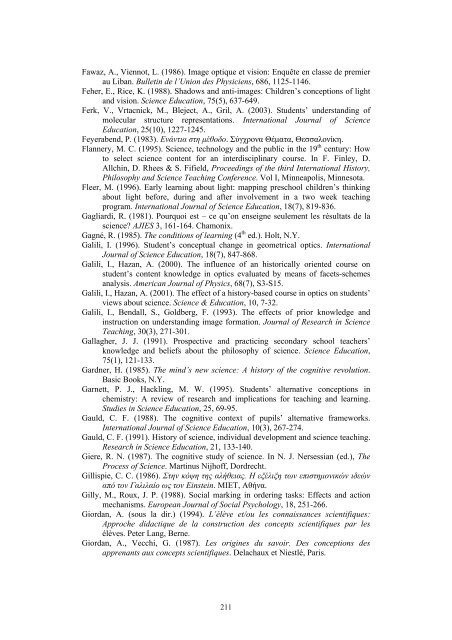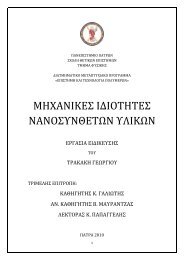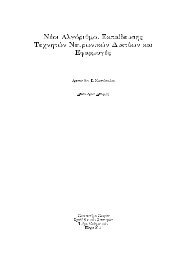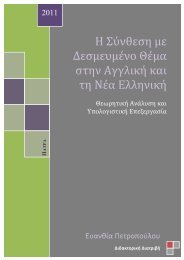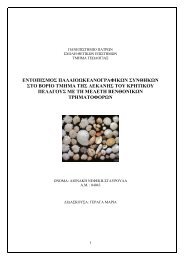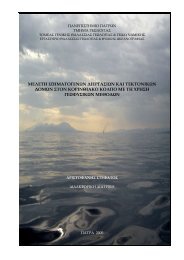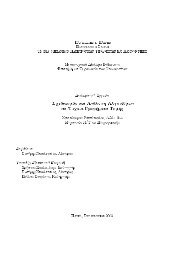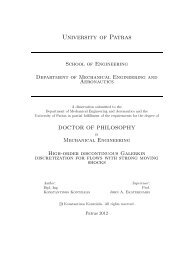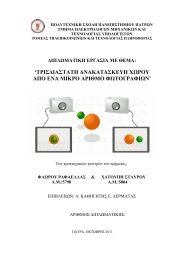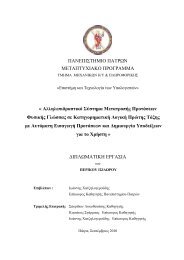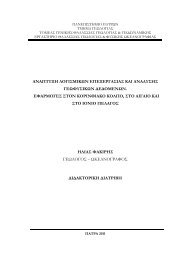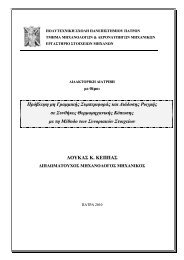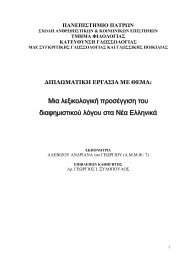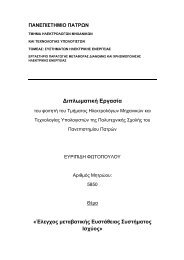Î ÎÎÎÎ ÎΣΤÎÎÎÎ Î ÎΤΡΩΠ- Nemertes
Î ÎÎÎÎ ÎΣΤÎÎÎÎ Î ÎΤΡΩΠ- Nemertes
Î ÎÎÎÎ ÎΣΤÎÎÎÎ Î ÎΤΡΩΠ- Nemertes
Create successful ePaper yourself
Turn your PDF publications into a flip-book with our unique Google optimized e-Paper software.
Fawaz, A., Viennot, L. (1986). Image optique et vision: Enquête en classe de premier<br />
au Liban. Bulletin de l’Union des Physiciens, 686, 1125-1146.<br />
Feher, E., Rice, K. (1988). Shadows and anti-images: Children’s conceptions of light<br />
and vision. Science Education, 75(5), 637-649.<br />
Ferk, V., Vrtacnick, M., Bleject, A., Gril, A. (2003). Students’ understanding of<br />
molecular structure representations. International Journal of Science<br />
Education, 25(10), 1227-1245.<br />
Feyerabend, P. (1983). Ενάντια στη μέθοδο. Σύγχρονα Θέματα, Θεσσαλονίκη.<br />
Flannery, M. C. (1995). Science, technology and the public in the 19 th century: How<br />
to select science content for an interdisciplinary course. In F. Finley, D.<br />
Allchin, D. Rhees & S. Fifield, Proceedings of the third International History,<br />
Philosophy and Science Teaching Conference. Vol I, Minneapolis, Minnesota.<br />
Fleer, M. (1996). Early learning about light: mapping preschool children’s thinking<br />
about light before, during and after involvement in a two week teaching<br />
program. International Journal of Science Education, 18(7), 819-836.<br />
Gagliardi, R. (1981). Pourquoi est – ce qu’on enseigne seulement les résultats de la<br />
science? AJIES 3, 161-164. Chamonix.<br />
Gagné, R. (1985). The conditions of learning (4 th ed.). Holt, N.Y.<br />
Galili, I. (1996). Student’s conceptual change in geometrical optics. International<br />
Journal of Science Education, 18(7), 847-868.<br />
Galili, I., Hazan, A. (2000). The influence of an historically oriented course on<br />
student’s content knowledge in optics evaluated by means of facets-schemes<br />
analysis. American Journal of Physics, 68(7), S3-S15.<br />
Galili, I., Hazan, A. (2001). The effect of a history-based course in optics on students’<br />
views about science. Science & Education, 10, 7-32.<br />
Galili, I., Bendall, S., Goldberg, F. (1993). The effects of prior knowledge and<br />
instruction on understanding image formation. Journal of Research in Science<br />
Teaching, 30(3), 271-301.<br />
Gallagher, J. J. (1991). Prospective and practicing secondary school teachers’<br />
knowledge and beliefs about the philosophy of science. Science Education,<br />
75(1), 121-133.<br />
Gardner, H. (1985). The mind’s new science: A history of the cognitive revolution.<br />
Basic Books, N.Y.<br />
Garnett, P. J., Hackling, M. W. (1995). Students’ alternative conceptions in<br />
chemistry: A review of research and implications for teaching and learning.<br />
Studies in Science Education, 25, 69-95.<br />
Gauld, C. F. (1988). The cognitive context of pupils’ alternative frameworks.<br />
International Journal of Science Education, 10(3), 267-274.<br />
Gauld, C. F. (1991). History of science, individual development and science teaching.<br />
Research in Science Education, 21, 133-140.<br />
Giere, R. N. (1987). The cognitive study of science. In N. J. Nersessian (ed.), The<br />
Process of Science. Martinus Nijhoff, Dordrecht.<br />
Gillispie, C. C. (1986). Στην κόψη της αλήθειας. Η εξέλιξη των επιστημονικών ιδεών<br />
από τον Γαλιλαίο ως τον Einstein. ΜΙΕΤ, Αθήνα.<br />
Gilly, M., Roux, J. P. (1988). Social marking in ordering tasks: Effects and action<br />
mechanisms. European Journal of Social Psychology, 18, 251-266.<br />
Giordan, A. (sous la dir.) (1994). L’élève et/ou les connaissances scientifiques:<br />
Approche didactique de la construction des concepts scientifiques par les<br />
élèves. Peter Lang, Berne.<br />
Giordan, A., Vecchi, G. (1987). Les origines du savoir. Des conceptions des<br />
apprenants aux concepts scientifiques. Delachaux et Niestlé, Paris.<br />
211


